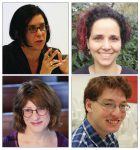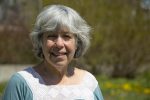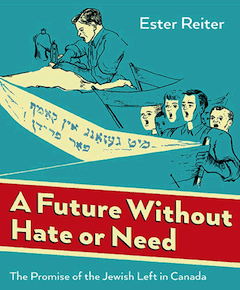The April 9 panel discussion Israel, Canada and Me in the Age of Trump will feature, clockwise from top left, Dr. Shayna Plaut (photo from Shayna Plaut), Ofira Roll (photo from Ofira Roll), Rabbi Susan Shamash (photo by Robert Albanese) and Eviatar Bach (photo from Eviatar Bach).
Israel, Canada and Me in the Age of Trump will be the topic discussed by a panel of four Jewish speakers on April 9 at the Peretz Centre for Secular Jewish Culture.
“Trump’s election in the U.S. has shifted the relationship that Diaspora Jews in general, and progressive Jews in particular, have with Israel,” Yom-Tov Shamash, one of the organizers, told the Independent. “I believe that most Jews in Vancouver, young and old, Zionist or not, affiliated, religious or secular, feel uncomfortable with the Israel-Trump alliance. Bringing four progressive Jewish leaders from different walks of life provides an opportunity for all Jews supporting values of social justice to hear different points of view, to find common ground, to develop relationships and hopefully to get involved in common causes.”
One the participants, Dr. Shayna Plaut, is research manager of the Global Reporting Centre. She is currently teaching courses on migration and social inequalities at the University of British Columbia and is adjunct professor in international studies, Simon Fraser University.
“Ashkenazi Jews in Canada and the U.S. are in greater positions of safety than we have ever been,” two or three generations removed from the Holocaust, said Plaut. “Ashkenazi Jews can pass for white. We have a responsibility to do something with this privilege, [to uphold] the tradition of tikkun olam.
“As a descendant of refugees, I have always felt connected to refugees,” she continued. “I work to make my ancestors proud and, right now, that means standing in solidarity with this generation of refugees.
“We all have different strengths. And we have a responsibility to see, and use our strengths. My strengths are in education and connection.”
Plaut said, “The level of intolerance in Canada and the U.S. has increased. I was born and raised in the U.S. I became a Canadian because I was having a hard time recognizing my own country. It’s not like racism didn’t exist before – we are a country built on colonization and slavery – but we are also a country built on ideals and resistance. I have always worked in this positive vein of how to make things better. I view patriotism as a commitment to make my country better. It’s easier to talk about what’s wrong than to present alternatives to make things better and work together. It was in December 2015 when I [began to feel] that perhaps I was able to do this better from Canada … as a Jew, as a dual citizen of the U.S. and Canada, and as an educator and worker for human rights and social justice.”
Ofira Roll, another of the panelists, is a PhD candidate in education at UBC. Born and raised in Israel, she reflected on what is involved in activism in Israel as opposed to Canada or the United States.
“Our activism here has productive aspects. However, it feels as if we do it by remote control,” said Roll. “I truly miss the messiness in Israel – the messiness of communication, liveliness and opinions, of cultures and interests. People have opinions and they share them and embody them. I know the darker sides of living there – it’s a nationalistic state, undemocratic, racist, capitalist and anti-human rights – but it feels more real to me, where I feel pushed to the edge in all aspects of life. I am asked to speak up for what I truly care about and act on it. For me, being ‘pro-Israel’ means criticizing what’s wrong.”
Roll is critical of recent Israeli legislation excluding supporters of boycotts from entering Israel. “Personally, I don’t believe in boycotting countries. Still, I can’t accept the idea that if I came to Israel and had decided to boycott, I’m on this list. Friends of mine would be on this list. I don’t understand how a democratic country can pass such an undemocratic law. It’s not just stopping people who don’t support Israel – it stops more Palestinians than anyone else so, in a way, it really is a racist law.
“As several philosophers I am influenced by – Martin Buber, Hannah Arendt – say, engaging in dialogue doesn’t mean that we are in agreement. Dialogue is more about the process we go through in the search for new understandings. Now, when I see everyone coming together, it’s a strong moment for me. In the time of Trump, that’s what I’m happy about. People start understanding that all these divisions are fake. We are not different at the core. The women’s marches we had all over the world – for women’s rights, which are human rights – ironically, thanks to Trump.
“It’s not about convincing, but about sharing. It’s an invitation to talk, first of all, as humans. I don’t believe in all these divisions and borders. I have a hard time with flags, anthems. I think home is within you. Home is not something defined by others. It doesn’t need always to be in the name of a country.”
Roll has found the atmosphere in Vancouver’s Jewish community fairly open. “When [Israeli singer] Ahinoam Nini came here,” she noted, “people fought to bring her, with the support of the Jewish Federation, against groups who did not believe she should be invited because she supports Palestinians’ causes. I wrote a collective letter [to the Federation] on behalf of my Hebrew-speaking community theatre group. They read our letter at a Federation meeting, and they were brave enough to take a stand, and Nini was invited. In the end, they made an extra effort to bring us all together to meet Nini after the show. The Jewish community here includes many other voices, even among synagogues. There are many small groups, which don’t follow one way.”
Panelist Eviatar Bach is graduating from UBC in physics and computer science. He is involved with the Social Justice Centre at UBC, is a co-founder of the UBC Progressive Jewish Alliance and a founding editor of the Talon, a progressive online student magazine.
“With the Trump administration, it appears that the U.S. has abandoned the pretense of an ongoing ‘peace process,’ with Trump expressing indifference at the choice between a one-state and a two-state solution, and the appointment of settlement backer David Friedman as ambassador to Israel,” said Eviatar.
“At the same time,” he continued, “there is perhaps more disagreement between mainstream Jewish organizations, which tend to uncritically support Israeli actions, and young Jews in North America, than ever before. New groups such as IfNotNow, predominantly composed of young Jews, emerged during Operation Protective Edge in 2014, and have taken more confrontational stances than, say, J Street, by protesting Jewish organizations that defend occupation and killings directly.
“On university campuses, the Open Hillel movement has sought to challenge Hillel International’s guidelines, which narrowly constrain the range of views that speakers at Hillels around the world are allowed to express. Several Independent Jewish Voices chapters have started at university campuses in Canada, and the Progressive Jewish Alliance was started at the University of British Columbia.”
Rounding out the panelists is Rabbi Susan Shamash, who was recently ordained by ALEPH: Alliance for Jewish Renewal. She is a retired lawyer and an active member of Congregation Or Shalom.
“As a recently ordained, progressive rabbi, my focus is always on the Jewish values that propel me towards acts of social justice, including engagement in interfaith dialogue and commitment to family and community, which includes my Jewish family and my Jewish community.
“As a born and bred Canadian (like both my parents), my relationship with Canada is foundational to my identity,” she said. “I have a deep and abiding faith in our legal and judicial systems and in our system of government which, though imperfect, is based on values of inclusion, social welfare and multiculturalism.
“As a religious Jew, my relationship with the Jewish community in general and Israel in particular is complicated, varied and nuanced. I often find myself interceding on behalf of a different perspective, of more open thinking and understanding. There is much more to Israel than the occupation and conflict with the Palestinians, but, unfortunately, that is what defines its current reputation in the world community.
“We live in troubled and troubling times,” said Shamash. “U.S. President Trump has already changed the world order in unprecedented ways. More worrisome is that he has a lot of support both within and without the United States. This is not just an American phenomenon.
“How do my Jewish values help me to live, survive and even thrive in this new world order? There are many that we repeat over and over again: seek peace, pursue justice, love your neighbour, welcome the stranger, be a holy people, steward the earth, perform acts of loving-kindness, repair the world.”
The April 9 event is sponsored by Independent Jewish Voices, Vancouver. It begins at 1 p.m. and the suggested donation is $10.
Carl Rosenberg is a member of the United Jewish People’s Order and Independent Jewish Voices Canada. For many years, he edited Outlook: Canada’s Progressive Jewish Magazine.



 Reiter emphasizes that this sector of the Jewish left had a life of its own distinct from the Communist party. “The leadership were Communist party members, but approximately 95% of the membership of the UJPO and its predecessors were not. One could think and say what one felt in the Jewish left without concern over whether it was the ‘correct’ position. Many people came [to the Jewish left] because of the liveliness of the community, as well as the politics.”
Reiter emphasizes that this sector of the Jewish left had a life of its own distinct from the Communist party. “The leadership were Communist party members, but approximately 95% of the membership of the UJPO and its predecessors were not. One could think and say what one felt in the Jewish left without concern over whether it was the ‘correct’ position. Many people came [to the Jewish left] because of the liveliness of the community, as well as the politics.”